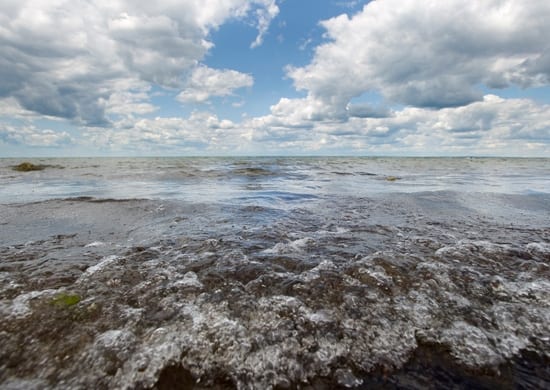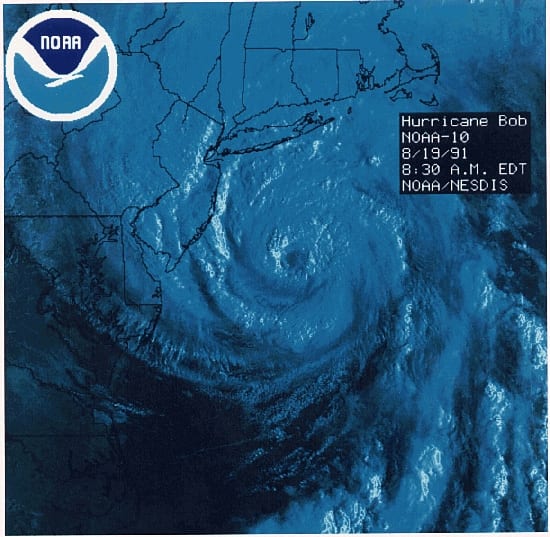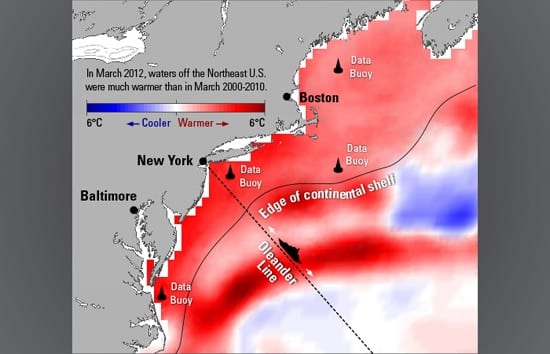WHOI Scientists Receive $1 Million Grant from MacArthur Foundation
September 3, 2014
Rapid climate change and an increasing range of climate impacts are already being felt along our coasts, and new research suggests that U.S. Northeast coastal waters may be more vulnerable to climate change and ocean acidification than previously thought.
How will communities prepare for and mitigate the impacts of these changes?
A team of scientists with the Woods Hole Oceanographic Institution have received a $1 million grant from The John D. and Catherine T. MacArthur Foundation to develop science-based climate change adaptation solutions for coastal communities and to partner with organizations to help communities anticipate change and to prepare to adapt.
The multi-pronged research project pairs scientists from WHOI with regional organizations actively involved in three key and interrelated coastal ocean climate impacts areas that are affecting many coastal communities in Southern New England: sea-level rise and coastal flooding; coastal water quality and ocean acidification; and ocean climate warming and fisheries.
“By working with organizations already established in aspects of these critical research areas, this project will have a collective impact to catalyze improved ocean management strategies and to help the public understand the changes our planet is experiencing,” said Scott Doney, a marine chemist at WHOI and the lead investigator on the project.
The project focuses specifically on the coastal waters of Buzzards Bay, Mass., and adjacent ocean continental shelf off of southern New England, but many of the lessons learned will be applicable broadly to coastal communities of the Northeast and entire U.S. eastern seaboard. Partnering organizations include the Buzzards Bay Coalition, the Commercial Fisheries Research Foundation, and The Nature Conservancy. Additionally, scientists will work with Princeton University colleague Dr. Ning Lin, who will provide modeling for many of the most extreme historic hurricanes impacting Buzzards Bay and simulations to assess the protective services provided by coastal wetlands and potential artificial reefs in the bay.
A significant goal of this project is to apply emerging scientific concepts and tools to empower local communities and stakeholder groups—the general public, NGOs, businesses, the academic community, policymakers and local, state and federal resource managers—with the information they need to make planning and infrastructure decisions in the face of climate change.
Sea-level rise and coastal flooding
Future rates of sea-level rise are projected to increase significantly over the coming decades. Further, we may also experience an increase in the frequency and intensity of hurricanes. “With the MacArthur grant we will be translating the results of our studies aimed at better understanding the risk associated with future changes in sea level and tropical cyclones in the communities within Buzzards Bay,” said Jeff Donnelly, a hurricane expert in the Coastal Systems Group at WHOI, who will lead the effort on the sea-level rise and coastal flooding theme. “In addition to developing tools to help translate the scientific results to decision makers and the general public, we are partnering with The Nature Conservancy to better understand whether or not the creation of artificial reefs might mitigate the impacts of storms surge associated with hurricanes.”
Coastal water quality and ocean acidification
Although there is rich historical data on nutrient pollution in Buzzards Bay, there has been little monitoring to date on acidification, which stands to have an impact on regional shellfish production. Building on an existing citizen scientist monitoring network run by the Buzzards Bay Coalition, the coastal water quality and ocean acidification theme expands new field sampling and synthesis capabilities to assess the impact of multiple stressors on coastal ecosystems. The team will use the data to develop and test alternative management strategies to improve degraded coastal waters, identifying locations particularly vulnerable to climate-related change, and enabling better long-term planning decisions to be made. The Buzzards Bay Coalition will be actively engaged in communicating the results of the research among its network.
Ocean climate warming and fisheries
The ocean climate warming and fisheries theme develops important connections between the commercial fleet, scientists, and decision-makers and expands our capability to cost-effectively monitor changes in ocean temperature and salinity on the coastal shelf and ultimately to understand how these changes impact the continental shelf ecosystem and its living marine resources. Commercial fishermen and women will be provided with and trained in the use of oceanographic sampling equipment to take weekly (and if possible, more frequent) measurements of temperature and salinity through the water column. The scientists and the fishing fleet will communicate regularly about the impacts of these physical changes through the Commercial Fisheries Research Foundation, an organization that has managed numerous industry-motivated research programs over the last several years, and semi-annual meetings between scientists and the fishing community. The data that is collected will also be broadly disseminated to the fishing community and general public using web databases.
“Temperature changes have been large and unprecedented on both seasonal and year-to-year time scales, and this data will provide great insights into how rapidly the coastal ocean is changing,” added Glen Gawarkiewicz, a WHOI coastal oceanographer who will lead the effort on the ocean climate warming and fisheries theme.
Across its focal themes, this innovative project will use a wide-range of communication vehicles and avenues to communicate the research findings, including online interactive tools and tutorials, public seminars, educational lesson plans, and other activities.
“While slowing climate change involves global cooperation on limiting further emissions of greenhouse gases, local and regional strategies can minimize climate change impacts,” said Doney. “Empowering local stakeholders, whether they are local property owners and municipalities, volunteer citizen scientists, or commercial fisherman, is a promising strategy for raising awareness and engagement on climate issues.”
The Woods Hole Oceanographic Institution is a private, non-profit organization on Cape Cod, Mass., dedicated to marine research, engineering, and higher education. Established in 1930 on a recommendation from the National Academy of Sciences, its primary mission is to understand the ocean and its interaction with the Earth as a whole, and to communicate a basic understanding of the ocean’s role in the changing global environment. For more information, please visit www.whoi.edu.



